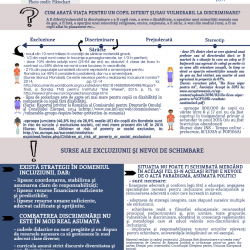Human Rights Education: a Reflection Through Three Question Marks
The United Nations (UN) named the 1995-2004 decade the decade for human rights education. Since then, the UN agencies have dedicated resources for the development of action plans and recommendations to encourage states to develop educational programs, both textbooks and school programs and non-formal education projects, through which young generations could be educated in the spirit of human rights. Their objective is to disseminate legal and civic culture knowledge, but also to disseminate values, principles and states of mind. The latter cannot be understated because the acceptance of difference, social solidarity, and freedom of expression cannot be theoretically understood, but only through daily practice, as we interact in family, school, and public space.
In the case of Romania such a project must first create favorable context. Civic responsibility is not just information to be passed on, but facilitated practice. Looking at this through the eyes of a person who has been educated in Romanian schools for 15 years, I feel a sense of ironic nostalgia remembering the obstacles that we should quickly overcome.
As a student, publicly revealing grades following test papers could turn into a theatre of humiliations. An early hierarchy among those who formed the micro-cosmos of the class had the effect of drawing the friendships and rivalries boundaries and of becoming the way many of us defined and perceived our abilities. Then I wonder: how long can solidarity in the spirit of human rights coexist with a system of valorization that public humiliates those who do not meet certain standard values?
As a student, the subjects were taught in the form of islands separated by light years – Romanian is about grammar, poetry and novels; History is about events, causes, consequences; Geography is about countries, cities, mountains, water etc. The school was more a world of boundaries and constraints than a world of multiple possibilities. In the word of possibilities, the Mathematics can be poetry; the countries from Geography can be the result of cooperation and conflicts from History; and the parables from Religion can be the metaphors of poetry in Romanian. Our subjects became denser over time, but they were not really talking to each other. Then I wonder: how long can a learning process which emphasizes on divisions and barriers coexist with a human rights practice showing how discrimination cuts along several categories ranging from gender, gender identity, race, ethnicity, age, disability, religion? It takes a lasting and daily practice of interdisciplinarity to clarify, by way of example, why it is pointless to identify yourself as a feminist and have gay friends and, in the same time, to believe that the Roma people have the life that they deserve and to be against welcoming refugees thinking they put your life in danger.
As a student, the undisputed authority belonged to the teacher. It took different forms: standing up and murmuring in a chorus a greeting when he or she entered the classroom; the interdiction to use the “teacher’s staircase”; accepting fear and shame, sometimes unconsciously, as emotions conducive to the learning process; teaching as an act of translation of undeniable realities. I am not trying to incite to rebellion or anarchy in classroom, or to promote insolence and lack of respect, but the effects of this authority are felt visible today still. The fear of public speaking or self-ostracism in case of wrong answer is viruses transmitted in Romanian school. Then I wonder: how long can a learning process which associates knowledge with accepting a final authority coexist with a practice of human rights that depends on activism, debating and questioning the status quo?
Every discussion on human rights in the context of the Romanian school must open a door to a constant query about the way of learning and the teaching act to which the Romanian student is exposed to. This is the only way to make an educational culture that for decades has promoted the creation of hierarchies, punished the mistakes and limited imagination compatible with the solidarity, activism that are proper to human rights.
by Ioana Tuță
Ioana Tuță is a founding member of the ACTEDO non-governmental organisation and has expertise in the field of human rights and international relations. She worked with the Advocacy Program of Amnesty International and the Human Rights Treaties Division of the UN Office of the High Commissioner for Human Rights.













